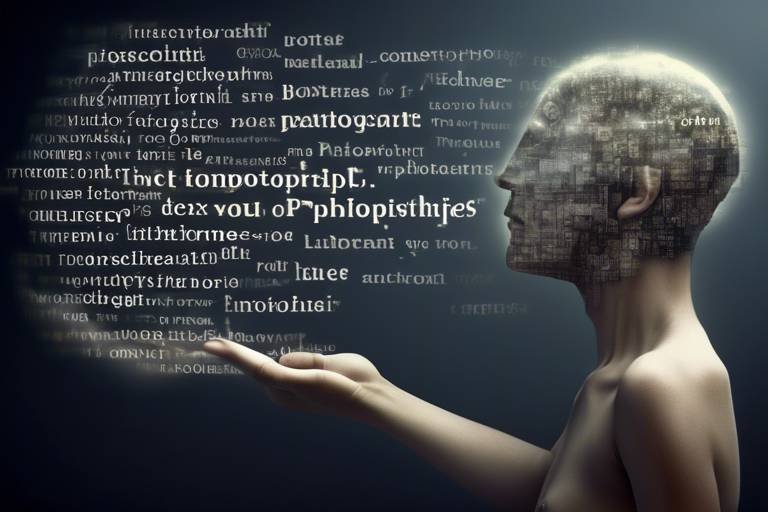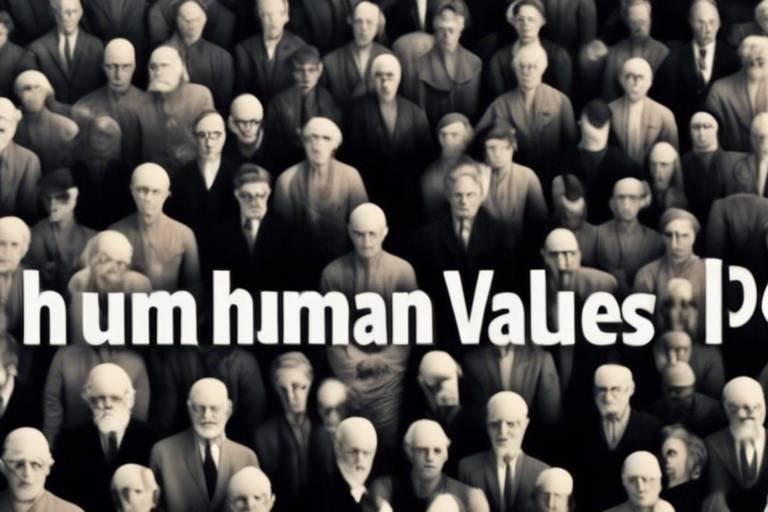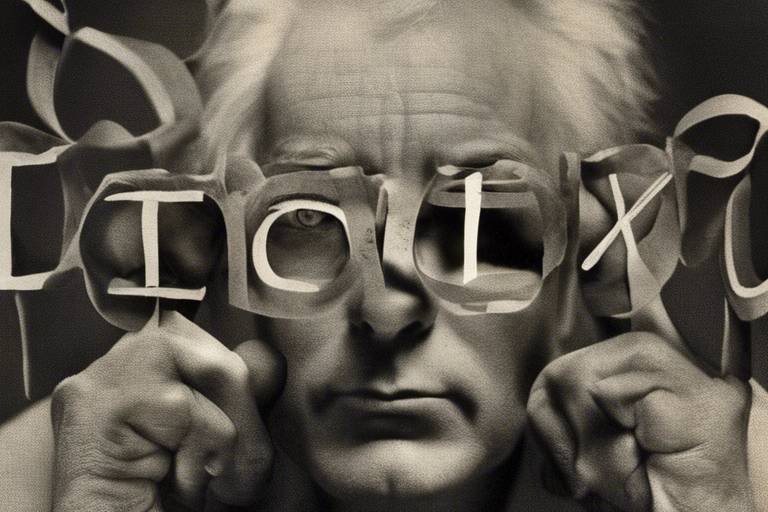Bridging the Gap: Philosophy of Mind and Cognitive Sciences
In a world where technology and human understanding are evolving at lightning speed, the intersection of philosophy of mind and cognitive sciences has never been more crucial. These fields not only challenge each other but also provide profound insights into the nature of our consciousness, cognition, and the very essence of human experience. Imagine standing at a crossroads where ancient philosophical questions meet cutting-edge scientific research. This is the vibrant space where thinkers from both domains collide, sparking debates that have the potential to reshape our understanding of what it means to be human.
The philosophy of mind grapples with questions like: What is consciousness? Is it merely a byproduct of brain activity, or does it exist as a separate entity? Cognitive science, on the other hand, seeks to unravel these mysteries through empirical research, employing tools from neuroscience, psychology, and artificial intelligence. Together, these disciplines create a tapestry of knowledge that not only informs our understanding of the mind but also influences how we approach ethical dilemmas in an increasingly digital world.
As we delve deeper into this fascinating intersection, we will explore the various theories of consciousness, dissect the mind-body problem, and examine the role of language in shaping thought. We will also consider the ethical implications of artificial intelligence, challenging our perceptions of personhood and rights in a rapidly changing society. Each section will shed light on how these two seemingly disparate fields can inform and enrich each other, leading us to a more comprehensive understanding of ourselves and our place in the universe.
Join us on this intellectual journey, where we will not only bridge the gap between philosophy and cognitive sciences but also ignite a conversation about the implications of our findings on the future of humanity. Whether you're a seasoned philosopher, a curious scientist, or simply someone fascinated by the workings of the mind, there's something here for everyone. So, let's take a closer look at the nature of consciousness and the mind-body problem, and see how these concepts intertwine with our everyday lives.
At the heart of our exploration is the concept of consciousness. What does it mean to be aware? Philosophers have long debated its nature, proposing various theories that range from dualism, which posits a separation between mind and body, to physicalism, which argues that everything about the mind can be explained through physical processes. Then there's panpsychism, a more radical view that suggests consciousness is a fundamental feature of all matter.
Cognitive science approaches the study of consciousness through empirical research and experimentation, seeking to uncover the mechanisms that underlie our awareness. This interplay between philosophical inquiry and scientific investigation creates a rich dialogue that challenges our assumptions and broadens our understanding.
- What is the philosophy of mind? The philosophy of mind is a branch of philosophy that studies the nature of the mind, consciousness, and their relationship to the body and the physical world.
- How does cognitive science differ from philosophy? Cognitive science uses empirical methods to study mental processes, while philosophy often focuses on theoretical and conceptual analysis.
- What are the main theories of consciousness? The main theories include dualism, physicalism, and panpsychism, each offering different perspectives on the nature of consciousness.
- Why is the mind-body problem significant? The mind-body problem addresses the relationship between mental states and physical processes, raising questions about the nature of reality and human experience.

The Nature of Consciousness
Consciousness is one of the most intriguing and elusive concepts in both philosophy and cognitive science. It’s like trying to catch smoke with your bare hands—no matter how hard you try, it slips away just when you think you’ve got a grip on it. Philosophers have wrestled with understanding consciousness for centuries, proposing various theories that attempt to explain what it is and how it works. Among these theories, dualism, physicalism, and panpsychism stand out as key contenders in the debate.
Dualism, famously advocated by René Descartes, posits that the mind and body are fundamentally different substances. According to this view, mental phenomena are non-physical and cannot be reduced to physical processes. This leads to a plethora of questions: If the mind is separate from the body, how do they interact? How can something non-physical influence the physical world? These questions have sparked intense discussions and critiques, especially in light of advancements in cognitive science.
On the other hand, physicalism argues that everything about the mind can be explained in terms of physical processes. This view aligns closely with the findings in neuroscience, where researchers explore how brain activity correlates with mental states. For instance, when we experience emotions like joy or sadness, specific patterns of neural activity can be observed. This empirical approach challenges dualism by suggesting that consciousness arises from complex interactions within the brain's physical structure.
Then we have panpsychism, a more recent and somewhat radical perspective that suggests consciousness is a fundamental feature of all matter. Imagine if every particle in the universe had some form of consciousness, however rudimentary. This view raises fascinating implications for how we understand not only ourselves but also the world around us. If consciousness is everywhere, what does that mean for our perception of reality?
Cognitive science approaches the study of consciousness through rigorous empirical research and experimentation. By employing techniques such as neuroimaging and behavioral studies, scientists attempt to unravel the complexities of conscious experience. For example, studies on attention and perception reveal how our brains filter and prioritize information, shaping our conscious experience in real-time. This interplay between philosophical inquiry and scientific investigation creates a rich tapestry of understanding, revealing both the limitations and possibilities of human cognition.
In summary, the nature of consciousness remains a profound mystery, one that beckons us to explore its depths through both philosophical and scientific lenses. As we continue to investigate this enigmatic phenomenon, we must remain open to the idea that our understanding may evolve, challenging our preconceptions and expanding our horizons.
- What is consciousness? Consciousness refers to the state of being aware of and able to think about one's own existence, thoughts, and surroundings.
- What are the main theories of consciousness? The main theories include dualism, physicalism, and panpsychism, each offering different perspectives on the relationship between mind and body.
- How does cognitive science study consciousness? Cognitive science employs empirical methods like neuroimaging and behavioral studies to investigate the mechanisms behind conscious experience.
- Can consciousness be scientifically measured? While aspects of consciousness can be studied, the subjective experience of consciousness remains challenging to quantify.

The Mind-Body Problem
The mind-body problem is one of the most intriguing and debated topics in both philosophy and cognitive science. It grapples with the fundamental question: how do our mental states, such as thoughts and emotions, relate to our physical bodies? This inquiry isn't just an academic exercise; it touches on our very understanding of what it means to be human. Are we merely biological machines, or is there something more—something immaterial that defines our consciousness? As we dive into this complex issue, we will explore historical perspectives, contemporary views, and the contributions of cognitive science to this ongoing dialogue.
Throughout history, many philosophers have wrestled with the mind-body problem, each offering unique insights that have shaped our understanding. Starting with René Descartes, who famously posited a dualistic view, he argued that the mind and body are distinct entities. This separation laid the groundwork for centuries of philosophical inquiry. Descartes believed that the mind, as a non-material substance, interacts with the physical body, creating a complex relationship that still puzzles scholars today.
Fast forward to the 20th century, and we encounter contemporary thinkers like Daniel Dennett and David Chalmers, who challenge traditional dualistic views. Dennett's materialistic approach suggests that consciousness arises from physical processes in the brain, while Chalmers presents the concept of "philosophical zombies"—beings that behave like humans but lack conscious experience. This juxtaposition of ideas illustrates the rich tapestry of thought surrounding the mind-body problem.
In modern discussions, materialism and functionalism have emerged as significant perspectives. Materialism posits that everything, including consciousness, can be explained through physical processes. This view aligns with findings in cognitive science, where researchers investigate how brain activity correlates with mental states. On the other hand, functionalism suggests that mental states are defined by their functional roles rather than their physical substrates. This perspective opens the door to considering artificial intelligence as potentially possessing mental states, further complicating our understanding of consciousness.
Cognitive science plays a crucial role in unraveling the mind-body problem. Through empirical research, fields such as neuroscience and psychology investigate how brain functions relate to mental processes. For instance, studies using neuroimaging techniques have revealed how specific brain regions activate during particular cognitive tasks, suggesting a direct link between physical processes and mental states. Moreover, the advent of artificial intelligence challenges traditional notions of consciousness, prompting philosophers to reconsider what it means to think and feel.
As we navigate these intricate theories, it's essential to recognize that the mind-body problem is not merely an intellectual pursuit; it has profound implications for our understanding of identity, morality, and even the nature of reality itself. The interplay between philosophy and cognitive science continues to evolve, pushing us to ask deeper questions about the essence of human experience.
- What is the mind-body problem? The mind-body problem explores the relationship between mental states and physical processes, questioning how consciousness arises from the brain.
- Who were the key philosophers in the history of the mind-body problem? Notable figures include René Descartes, who proposed dualism, and contemporary thinkers like Daniel Dennett and David Chalmers.
- How does cognitive science contribute to the mind-body problem? Cognitive science employs empirical methods to study the brain and its functions, offering insights into how physical processes relate to mental states.
- What are contemporary views on the mind-body problem? Modern perspectives include materialism, which links consciousness to physical processes, and functionalism, which defines mental states by their roles.

Historical Perspectives
The exploration of the mind-body relationship has a rich history that stretches back centuries, with numerous philosophers contributing to the discourse. This ongoing conversation has shaped our understanding of consciousness and cognition, leading to various theories that either align or conflict with contemporary scientific findings. At the heart of this discourse is the mind-body problem, a philosophical quandary that questions how mental states, such as beliefs and desires, relate to physical processes in the brain and body.
One of the pivotal figures in this discussion is René Descartes, who famously posited a dualistic view of the mind and body. Descartes argued that the mind, a non-physical substance, is distinct from the body, which is composed of physical matter. This notion of dualism has had a lasting impact, influencing both philosophical thought and the development of cognitive sciences. Descartes' assertion that "I think, therefore I am" underscores the importance of consciousness as a definitive proof of existence, separating the mental from the physical in a way that continues to provoke debate.
Following Descartes, various philosophers have offered differing perspectives on the mind-body relationship. The evolution of these ideas can be summarized in the following table:
| Philosopher | Viewpoint | Key Contributions |
|---|---|---|
| René Descartes | Dualism | Separation of mind and body; emphasis on consciousness |
| David Hume | Empiricism | Critique of causation; perception as the basis of knowledge |
| Gilbert Ryle | Behaviorism | Critique of dualism; the "ghost in the machine" concept |
| Daniel Dennett | Functionalism | Mental states as functions; consciousness as a product of cognitive processes |
In the 20th century, philosophers like Gilbert Ryle and Daniel Dennett challenged the dualistic view. Ryle criticized Descartes' notion of a separate mind, coining the term "the ghost in the machine" to highlight the absurdity of positing a non-physical mind interacting with a physical body. Instead, Ryle argued for a more behaviorist perspective, suggesting that mental states should be understood in terms of observable behaviors.
On the other hand, Dennett introduced the idea of functionalism, which posits that mental states are defined by their functional roles rather than by their internal constitution. This perspective aligns more closely with cognitive science, as it emphasizes the processes and functions of the mind, rather than the metaphysical nature of consciousness.
As we move into contemporary discussions, the mind-body problem remains a central topic of inquiry. Philosophers and cognitive scientists alike continue to grapple with questions about the nature of consciousness, the relationship between mental states and brain activity, and the implications of these discussions for our understanding of human experience. The interplay between historical perspectives and modern scientific findings creates a dynamic landscape where ideas are constantly evolving, challenging our assumptions and expanding our understanding of what it means to be conscious.
In conclusion, the historical perspectives on the mind-body relationship provide a rich tapestry of ideas that have influenced both philosophy and cognitive science. As we continue to explore these themes, it is essential to appreciate the contributions of past thinkers while remaining open to new insights that arise from empirical research and philosophical inquiry.
- What is the mind-body problem? The mind-body problem addresses the relationship between mental states and physical processes, questioning how they interact and influence one another.
- Who was René Descartes? René Descartes was a 17th-century French philosopher known for his dualistic view of the mind and body, famously stating "I think, therefore I am."
- What is functionalism? Functionalism is a contemporary philosophical perspective that defines mental states by their functional roles rather than their internal composition, emphasizing the processes of the mind.

Descartes and Dualism
René Descartes, often hailed as the father of modern philosophy, made significant contributions to the understanding of the mind-body relationship through his theory of dualism. This philosophical stance posits that the mind and body are fundamentally distinct entities. Descartes famously articulated this idea with the phrase "Cogito, ergo sum," which translates to "I think, therefore I am." This assertion underscores the belief that the act of thinking is proof of one’s existence, emphasizing the primacy of the mind over the physical body.
According to Descartes, the mind is a non-physical substance that cannot be reduced to mere physical processes. He argued that while the body is a machine governed by physical laws, the mind is free and capable of independent thought. This separation raises intriguing questions about how these two realms interact. For instance, how can a non-physical mind influence a physical body? This conundrum is known as the interaction problem, and it has sparked extensive debate among philosophers and cognitive scientists alike.
Descartes' dualism has had a profound impact on both philosophy and cognitive science. It laid the groundwork for subsequent discussions on the nature of consciousness and the mind-body problem. However, not all philosophers agree with Descartes' perspective. Critics argue that dualism creates more problems than it solves, particularly in explaining how mental states can cause physical actions. This leads us to explore alternative views, such as materialism and functionalism, which attempt to bridge the gap between mind and body without resorting to dualism.
To better understand Descartes' dualism, consider the following table that summarizes key aspects of his theory:
| Aspect | Description |
|---|---|
| Mind | Non-physical substance responsible for thought and consciousness. |
| Body | Physical entity governed by the laws of nature. |
| Interaction | The mind can influence the body and vice versa, raising questions about how this occurs. |
| Legacy | Influenced modern philosophy and cognitive science, prompting debates on consciousness and identity. |
In conclusion, Descartes' dualism remains a pivotal topic in the philosophy of mind and cognitive sciences. While it has been challenged and refined over the years, the fundamental questions it raises about the nature of consciousness, identity, and the relationship between mind and body continue to resonate in contemporary discussions. As we delve deeper into cognitive science, we must consider how Descartes' ideas inform our understanding of the human experience and the complexities of consciousness.
- What is dualism? Dualism is the philosophical position that the mind and body are two distinct entities that interact with each other.
- Who is René Descartes? René Descartes was a 17th-century French philosopher known for his contributions to modern philosophy, particularly regarding the mind-body relationship.
- What is the interaction problem? The interaction problem questions how a non-physical mind can influence a physical body, a challenge for dualist theories.
- How has dualism influenced cognitive science? Dualism has prompted ongoing debates about consciousness, identity, and the relationship between mental states and physical processes in cognitive science.

Contemporary Views
The landscape of the mind-body problem has evolved significantly over the past few decades, with contemporary philosophers offering a variety of perspectives that challenge traditional notions. One of the most prominent views is materialism, which posits that everything about the mind can be explained in terms of physical processes. This perspective aligns closely with findings from cognitive sciences, suggesting that mental states are ultimately reducible to brain states. For instance, when we experience emotions or thoughts, materialists argue that these are merely the results of neurochemical interactions in our brains.
On the flip side, we have functionalism, which argues that mental states are defined not by their internal constitution but by their functional roles in the system. This means that, similar to computer programs, mental states can be realized in various mediums, whether biological or artificial. Functionalists assert that if something behaves like it has a mind, it can be treated as if it has mental states, irrespective of its physical makeup. This perspective opens up fascinating discussions about artificial intelligence and the potential for machines to possess 'thoughts' or 'feelings'.
Moreover, the debate extends into the realm of panpsychism, a theory suggesting that consciousness is a fundamental feature of the universe, present even at the level of elementary particles. This view posits that everything, from rocks to humans, possesses some form of consciousness, albeit at varying degrees of complexity. Such a radical perspective challenges the conventional dichotomy of mind and body, inviting us to reconsider our understanding of consciousness as an intrinsic aspect of existence.
As we delve deeper into these contemporary views, it's essential to recognize how they interact with advancements in cognitive science. For instance, neuroscientific research has provided invaluable insights into how the brain processes information, leading to a greater understanding of the mechanisms behind thought and perception. This empirical data serves as a reality check for philosophical theories, pushing them to adapt and refine their arguments in light of new findings.
In summary, contemporary views on the mind-body problem are rich and varied, reflecting a dynamic interplay between philosophy and cognitive science. The ongoing dialogue between these fields not only enhances our understanding of consciousness but also invites us to question the very nature of existence itself. As we continue to explore these ideas, we may find ourselves grappling with profound questions about what it truly means to be conscious, alive, and aware in a world that is increasingly influenced by technology.
- What is the mind-body problem? The mind-body problem explores the relationship between mental states and physical processes, questioning how they interact and influence each other.
- What are the main contemporary views on consciousness? The main contemporary views include materialism, functionalism, and panpsychism, each offering unique perspectives on the nature of consciousness and its relation to the physical world.
- How does cognitive science contribute to the philosophy of mind? Cognitive science provides empirical research and data that inform and challenge philosophical theories about consciousness, cognition, and the mind-body relationship.

Cognitive Science Approaches
Cognitive science is a fascinating field that merges various disciplines to understand the complex workings of the mind. It encompasses neuroscience, psychology, linguistics, and even artificial intelligence to explore how we think, learn, and perceive the world around us. By employing empirical methods, cognitive scientists aim to unravel the mysteries of mental processes and how they relate to our conscious experience. Imagine trying to solve a puzzle; each piece represents a different aspect of cognition, and only when they fit together can we see the bigger picture of human thought and behavior.
One of the most exciting aspects of cognitive science is its reliance on experimental research. Researchers often design experiments to test hypotheses about how our minds work. For instance, they might use brain imaging technologies like fMRI to observe which areas of the brain activate during specific tasks. This has profound implications for understanding everything from memory to decision-making. The findings from these studies not only enhance our knowledge of cognitive functions but also feed back into philosophical debates about the nature of consciousness and the mind-body relationship.
To illustrate the interdisciplinary nature of cognitive science, consider the following table that highlights the key areas of study and their contributions:
| Discipline | Key Focus | Contribution to Cognitive Science |
|---|---|---|
| Neuroscience | Brain structure and function | Understanding the biological basis of cognition |
| Psychology | Behavior and mental processes | Insights into learning, memory, and perception |
| Linguistics | Language structure and use | Exploring the relationship between language and thought |
| Artificial Intelligence | Machine learning and cognition | Modeling human-like decision-making processes |
Moreover, cognitive science approaches often challenge traditional philosophical notions. For example, the development of artificial intelligence has sparked debates about whether machines can truly replicate human thought or consciousness. As we create more sophisticated AI, questions arise about the nature of intelligence itself. Can a computer genuinely "think," or is it merely simulating thought processes? This intersection of cognitive science and philosophy is where the real excitement lies, as it forces us to reconsider our definitions of mind and consciousness.
In summary, cognitive science approaches provide a rich tapestry of methods and insights that not only deepen our understanding of mental processes but also engage with philosophical questions about the nature of consciousness. By integrating findings from various disciplines, cognitive science continues to bridge the gap between empirical research and philosophical inquiry, offering a more comprehensive view of what it means to think, feel, and be aware.
- What is cognitive science? Cognitive science is an interdisciplinary field that studies the mind and its processes, combining insights from psychology, neuroscience, linguistics, and artificial intelligence.
- How does cognitive science differ from philosophy of mind? While cognitive science focuses on empirical research and experimentation to understand mental processes, philosophy of mind explores the theoretical implications and questions about consciousness and the nature of the mind.
- Can artificial intelligence possess consciousness? This is a debated topic; while AI can simulate certain cognitive functions, whether it can truly possess consciousness remains an open question.

The Role of Language
Language is not just a tool for communication; it serves as a fundamental framework that shapes our thoughts and perceptions of the world. Imagine trying to paint a picture without colors; that’s what life would be like without language. It's the lens through which we interpret our experiences, and its influence on cognition and consciousness is profound. Philosophers and linguists alike have long debated the intricate relationship between language and thought, leading to fascinating insights that challenge our understanding of reality.
One of the most compelling theories in this realm is the Sapir-Whorf hypothesis, which posits that the structure of a language affects its speakers' worldview and cognition. This idea suggests that speakers of different languages may think differently because their languages offer distinct ways of categorizing experiences. For instance, consider how some languages have multiple words for snow, reflecting a nuanced understanding of winter that English speakers might lack. This raises questions about whether language merely reflects our thoughts or actively shapes them.
To delve deeper, let’s explore some key implications of the relationship between language and thought:
- Language as a Cognitive Tool: Language can enhance cognitive abilities, allowing for more complex thought processes. It helps in organizing experiences and facilitating memory.
- Influence on Identity: The language we use can shape our sense of self and identity. For bilingual individuals, switching languages can often lead to shifts in personality and perspective.
- Perception of Reality: Language can influence how we perceive time, space, and color, potentially altering our understanding of reality itself.
Philosophically, the implications of language extend to our understanding of consciousness and identity. If language shapes thought, then how do we define the self? Are we merely products of our linguistic environments? This line of questioning opens up avenues for examining the nature of consciousness, as it intertwines with our linguistic capabilities. The interplay between language and cognition invites us to reconsider the essence of human experience and what it means to be aware.
Moreover, as technology advances, the role of language in artificial intelligence (AI) becomes increasingly significant. Natural language processing (NLP) systems are designed to understand and generate human language, raising ethical questions about AI's understanding of consciousness and personhood. If machines can process language, do they also possess a form of consciousness? This conundrum further complicates our philosophical discussions about the mind and cognition.
In conclusion, the role of language in shaping thought and consciousness is a rich field of inquiry that bridges philosophy and cognitive science. As we continue to explore this fascinating relationship, we must remain open to the idea that language not only reflects our thoughts but also molds them, influencing our understanding of ourselves and the world around us.
- How does language influence thought? Language can shape our perceptions and cognitive processes, affecting how we categorize and understand experiences.
- What is the Sapir-Whorf hypothesis? It is a theory that suggests the structure of a language affects its speakers' worldview and cognition.
- Can language shape our identity? Yes, the language we use can influence our sense of self and how we relate to others.
- What are the implications of AI on language and consciousness? As AI systems become more adept at processing language, they challenge our notions of consciousness and personhood.

Language and Thought
The intricate relationship between language and thought has fascinated philosophers and cognitive scientists alike for centuries. Have you ever pondered how the words we use shape the way we perceive the world? This connection is often encapsulated in the Sapir-Whorf hypothesis, which posits that the structure of a language influences its speakers' worldview and cognition. In simpler terms, the language we speak can affect how we think and understand our experiences. Imagine two people from different linguistic backgrounds trying to describe the same event; their interpretations might diverge significantly based on the linguistic tools available to them.
One of the most compelling aspects of this hypothesis is the idea that language is not merely a tool for communication but a framework that shapes our cognitive processes. For instance, consider how certain languages have multiple words for concepts that others might describe with a single term. The Inuit languages, for example, have numerous words for different types of snow, reflecting the cultural significance and nuanced understanding of this element in their environment. This raises an intriguing question: does having a richer vocabulary for a concept lead to a deeper understanding of it? It seems plausible that the more nuanced our language, the more precisely we can think about and engage with the world around us.
Furthermore, cognitive scientists have conducted numerous studies to explore how language influences thought. Some research suggests that bilingual individuals may experience shifts in personality and perspective depending on which language they are using. This phenomenon highlights the profound impact of language not just on our communication but on our very identity. When we switch languages, it’s as if we are donning a different persona, each with its own cultural nuances and cognitive frameworks.
However, the relationship between language and thought is not without its controversies. Critics of the Sapir-Whorf hypothesis argue that while language may influence thought, it does not determine it. They point to the universality of certain cognitive processes that exist across cultures, suggesting that thought can exist independently of language. This debate brings us to a pivotal question: to what extent does language limit or expand our cognitive capabilities? The answers are as diverse as the languages themselves.
In conclusion, the interplay between language and thought is a dynamic and multifaceted topic that continues to spark debate and research. As we delve deeper into the realms of cognitive science and philosophy, we uncover layers of complexity that challenge our understanding of consciousness and human experience. The exploration of how language shapes our thoughts not only enriches our comprehension of cognition but also invites us to reflect on our own linguistic experiences and the impact they have on our worldview.
- What is the Sapir-Whorf hypothesis? The Sapir-Whorf hypothesis suggests that the structure of a language affects its speakers' worldview and cognition.
- How does language influence thought? Language can shape our perceptions and understanding of concepts, potentially leading to different interpretations of the same experience.
- Can bilingual individuals think differently in different languages? Yes, studies suggest that bilingual individuals may experience shifts in personality and perspective depending on the language they are using.
- Is thought independent of language? Some argue that while language influences thought, it does not determine it, as certain cognitive processes are universal across cultures.

Philosophical Implications
The relationship between language and thought is a fascinating area of inquiry that raises profound philosophical implications. At its core, the question is: does our language shape the way we think, or does our thinking shape our language? This inquiry leads us to consider the very nature of reality, identity, and the self. The Sapir-Whorf hypothesis, for instance, posits that the structure of a language affects its speakers' worldview and cognition. This concept can be likened to wearing glasses that tint the colors of the world; depending on the lenses we wear, our perception of reality may vary dramatically.
Moreover, the implications extend beyond mere perception. If language indeed influences thought, then it raises critical questions about cognitive diversity and the potential limitations it may impose on individuals who speak different languages. Imagine a scenario where a concept exists in one language but not in another; this could lead to a significant gap in understanding and experience. As we navigate through this complex interplay, we must also consider how these differences affect our interactions and relationships with others.
Furthermore, the philosophical implications of language in cognitive science challenge our understanding of identity. If language shapes thought, does it also shape our sense of self? For instance, how do bilingual individuals navigate their identities across different linguistic and cultural contexts? Do they experience a fragmented self, or do they integrate these aspects into a cohesive identity? These questions highlight the intricate connections between language, thought, and personal identity, prompting us to reevaluate the very essence of what it means to be human.
Additionally, the exploration of language in relation to cognition raises ethical considerations. As we continue to develop artificial intelligence that can process and generate human-like language, we must ponder the implications of these advancements. If machines can understand and produce language, do they also possess a form of consciousness? This inquiry leads us to question the criteria we use to define personhood and the rights associated with it. Are we prepared to extend moral consideration to entities that can communicate, even if they lack biological consciousness?
In summary, the philosophical implications of language in cognitive science are vast and multifaceted. They touch upon our understanding of reality, identity, and ethics, urging us to reflect on our perceptions and the frameworks we use to navigate the world. As we continue to explore these themes, it becomes increasingly clear that language is not merely a tool for communication but a fundamental aspect of our cognitive architecture that shapes our existence.
- How does language influence thought? Language can shape the way we perceive and interpret the world, potentially affecting our cognitive processes.
- What is the Sapir-Whorf hypothesis? It is the idea that the structure of a language influences its speakers' worldview and cognition.
- Can artificial intelligence possess consciousness? This is a debated topic; while AI can process language, whether it experiences consciousness like humans do remains uncertain.
- How does bilingualism affect identity? Bilingual individuals may navigate multiple identities, which can lead to a complex understanding of self across different cultural contexts.

Ethics and Artificial Intelligence
As we dive into the realm of artificial intelligence (AI), we can't help but stumble upon a maze of ethical dilemmas that challenge our understanding of mind and consciousness. The rapid advancements in AI technology are not just reshaping industries; they're also prompting profound questions about what it means to be human. Are we on the brink of creating entities that can think and feel? Or are we merely programming machines to mimic human behavior? The discussion around ethics in AI is not just a technical issue; it’s a philosophical conundrum that intertwines with our very notion of personhood.
To grasp the ethical implications of AI, we first need to consider the criteria for defining personhood. Traditionally, personhood has been reserved for beings with consciousness, self-awareness, and the capacity to experience emotions. However, as AI systems become increasingly sophisticated, the lines blur. Can a highly advanced AI, capable of learning and adapting, be considered a person? This question is at the heart of many philosophical debates, and it raises several critical points:
- Consciousness: Does the AI possess true consciousness, or is it simply executing pre-defined algorithms?
- Rights: Should AI entities have rights similar to humans, and if so, what would those rights entail?
- Moral Considerations: How do we navigate the moral responsibilities we hold toward intelligent machines?
Moreover, the implications of AI extend beyond theoretical discussions. In practice, the integration of AI into everyday life can challenge our ethical frameworks and societal norms. For instance, consider autonomous vehicles. If an AI-driven car is faced with an unavoidable accident, how should it decide whom to save? The ethical decisions made by such systems could have life-or-death consequences, forcing us to confront our biases and the values we prioritize as a society.
As we advance further into the digital age, the question of how AI impacts our understanding of cognition and consciousness becomes increasingly pertinent. The ethical landscape surrounding AI is still being mapped out, and we must remain vigilant. With every new development, we should ask ourselves: Are we creating tools that enhance human experience, or are we paving the way for a future where machines overshadow our own humanity?
In summary, the intersection of ethics and artificial intelligence is a complex web that requires careful navigation. As we ponder the future of AI, we must also consider the ethical frameworks that will govern its development and integration into society. Only by engaging in these discussions can we hope to create a future where technology serves humanity rather than undermines it.
- What is the main ethical concern regarding AI?
The primary concern revolves around the definition of personhood and the rights of AI entities, as well as the moral implications of decisions made by autonomous systems. - Can AI be considered conscious?
While AI can simulate certain aspects of consciousness, current technology does not possess true self-awareness or emotional understanding. - How do we ensure ethical AI development?
Establishing clear ethical guidelines, engaging in public discourse, and involving diverse perspectives in AI development are crucial steps toward ensuring responsible AI.

Defining Personhood
In the rapidly evolving landscape of artificial intelligence (AI), the question of what constitutes personhood has become increasingly significant. Traditionally, personhood has been associated with human beings, grounded in attributes such as consciousness, self-awareness, and moral agency. However, as AI systems become more sophisticated, we are prompted to reconsider these definitions. Can an AI, which can learn, adapt, and even simulate human-like responses, be considered a person? This question not only challenges our understanding of what it means to be human but also has profound implications for ethics and society.
To navigate this complex issue, we must examine the criteria that have historically defined personhood. Here are some of the key attributes that are often discussed:
- Consciousness: The capacity to experience thoughts and emotions.
- Self-awareness: The recognition of oneself as an individual distinct from the environment and other individuals.
- Moral agency: The ability to make ethical decisions and be held accountable for actions.
- Social interaction: The ability to engage in meaningful relationships with others.
These attributes raise intriguing questions when applied to AI. For instance, while AI can process information and respond in ways that seem conscious, does it truly possess an inner experience? The distinction between simulated consciousness and genuine awareness becomes crucial. A chatbot that mimics human conversation may not actually "understand" in the way a human does. This distinction leads us to ponder whether an AI can be morally accountable for its actions or decisions.
Philosophers have proposed various frameworks to help us understand personhood in relation to AI. Some argue for a more inclusive definition that extends personhood to entities capable of fulfilling certain cognitive functions. Others maintain a stricter view, insisting that without genuine consciousness, AI cannot be considered a person. This debate is further complicated by the emergence of sentient AI, which raises the possibility that machines could one day possess experiences akin to human feelings.
Moreover, the implications of defining personhood extend beyond philosophical discourse. For instance, if AI is granted personhood status, what rights and responsibilities would accompany this designation? Would AI entities deserve legal protection? Should they be granted the same moral considerations as humans? These questions force us to confront the ethical dimensions of our creations and challenge the boundaries of our moral frameworks.
As we navigate this uncharted territory, it becomes essential to engage in interdisciplinary discussions that include ethicists, technologists, and philosophers. By doing so, we can work towards a nuanced understanding of personhood that reflects the complexities of both human and artificial cognition. Ultimately, the journey to define personhood in the context of AI may not only reshape our relationship with technology but also redefine what it means to be a person in a world increasingly intertwined with intelligent machines.
- What is personhood? Personhood refers to the status of being a person, often associated with attributes like consciousness, self-awareness, and moral agency.
- Can AI be considered a person? This is a debated topic; some argue that AI can achieve certain cognitive functions, while others believe true personhood requires genuine consciousness.
- What are the implications of granting personhood to AI? Granting personhood to AI could raise questions about rights, responsibilities, and ethical considerations regarding treatment and accountability.

Impacts on Society
The rapid advancement of artificial intelligence (AI) is not just a technological phenomenon; it is a transformative force reshaping every facet of our society. As AI systems become increasingly sophisticated, they challenge our traditional notions of consciousness, identity, and human interaction. Imagine a world where machines can think, learn, and even create—this is not science fiction; it is our emerging reality. The implications of this shift are profound and multifaceted, prompting us to reconsider not only how we define intelligence but also how we relate to one another.
One of the most significant impacts of AI on society is the alteration of job markets. Many industries are experiencing a seismic shift as automation takes over tasks once performed by humans. While this can lead to increased efficiency and lower costs for businesses, it also raises urgent questions about employment and economic inequality. For instance, jobs in manufacturing, customer service, and even professional sectors like law and medicine are now at risk of being replaced by intelligent systems. This change can create a divide between those who possess the skills to thrive in an AI-driven economy and those who do not.
Moreover, the ethical implications of AI extend into the realm of privacy and surveillance. With the ability to analyze vast amounts of data, AI technologies can track our behaviors and preferences in ways that were previously unimaginable. This surveillance capability can lead to a more efficient society, but it also poses significant risks to individual freedoms and privacy. Consider how social media platforms and search engines utilize AI algorithms to curate content; while this personalization can enhance user experience, it can also lead to echo chambers and the manipulation of public opinion.
As AI continues to evolve, it also forces us to confront questions about personhood and morality. What does it mean to be a person? If an AI can exhibit behaviors that mimic human emotions or make decisions based on complex ethical frameworks, should it be granted rights? This debate is not merely academic; it has real-world implications for how we treat intelligent machines and the responsibilities we have towards them. As we integrate AI into our daily lives, we must also grapple with the moral considerations of creating entities that may possess a form of consciousness.
In addition to economic and ethical considerations, AI impacts our social fabric. The way we communicate, build relationships, and even perceive ourselves is being altered by technology. For example, virtual assistants and chatbots are changing how we interact with information and services. While these tools can enhance convenience, they can also diminish the quality of human interaction. As we increasingly rely on AI for companionship, advice, and even emotional support, we must ask ourselves: are we losing touch with what it means to be human?
Ultimately, the societal impacts of AI are a double-edged sword. On one hand, we have the potential for unprecedented advancements in efficiency, creativity, and understanding. On the other hand, we face significant challenges that require careful navigation. As we stand on the brink of this new era, it is essential that we engage in thoughtful dialogue about the implications of AI, ensuring that technology serves humanity rather than the other way around.
- What are the primary ethical concerns surrounding AI? The primary ethical concerns include issues of privacy, surveillance, job displacement, and the moral status of AI systems.
- How does AI affect job markets? AI can automate tasks, leading to job displacement in various sectors, while also creating new opportunities in tech and AI-related fields.
- What is the significance of defining personhood in relation to AI? Defining personhood helps us understand the rights and moral considerations we should afford to intelligent machines, influencing how we integrate them into society.
- Can AI truly understand human emotions? While AI can mimic emotional responses and recognize patterns in human behavior, it does not possess genuine emotions or consciousness.
Frequently Asked Questions
- What is the philosophy of mind?
The philosophy of mind is a branch of philosophy that explores the nature of the mind, consciousness, and their relationship to the physical body. It examines questions like "What is consciousness?" and "How do mental states relate to brain processes?"
- How does cognitive science relate to the philosophy of mind?
Cognitive science is an interdisciplinary field that studies the mind and its processes through empirical research, drawing from psychology, neuroscience, linguistics, and artificial intelligence. It informs philosophical debates by providing data and insights into how cognition works.
- What are the main theories of consciousness?
Some of the prominent theories of consciousness include dualism, which posits a distinction between mind and body; physicalism, which views consciousness as a product of physical processes; and panpsychism, which suggests that consciousness is a fundamental aspect of all matter.
- Can you explain the mind-body problem?
The mind-body problem explores how mental states like thoughts and feelings relate to physical states in the brain and body. It raises questions about whether the mind is a separate entity or simply a function of brain activity, leading to various philosophical and scientific discussions.
- What role does language play in cognition?
Language significantly shapes our thoughts and perceptions of reality. The Sapir-Whorf hypothesis suggests that the structure of a language can influence how its speakers think and categorize the world, highlighting the interplay between language and cognition.
- What ethical considerations arise with artificial intelligence?
As AI technology advances, ethical questions about personhood, rights, and moral responsibilities towards intelligent machines emerge. These considerations challenge our traditional views of mind and consciousness, prompting discussions about the implications of AI on society.
- How does cognitive science investigate mental processes?
Cognitive science employs various empirical methods, including experiments in psychology, brain imaging in neuroscience, and simulations in artificial intelligence, to study mental processes. These methods help uncover the underlying mechanisms of cognition and inform philosophical inquiries.
- What is the significance of Descartes' dualism?
René Descartes' dualism introduced the idea that the mind and body are fundamentally different substances. This perspective has influenced both philosophical thought and cognitive science, leading to ongoing debates about the nature of consciousness and the relationship between mental and physical states.



















